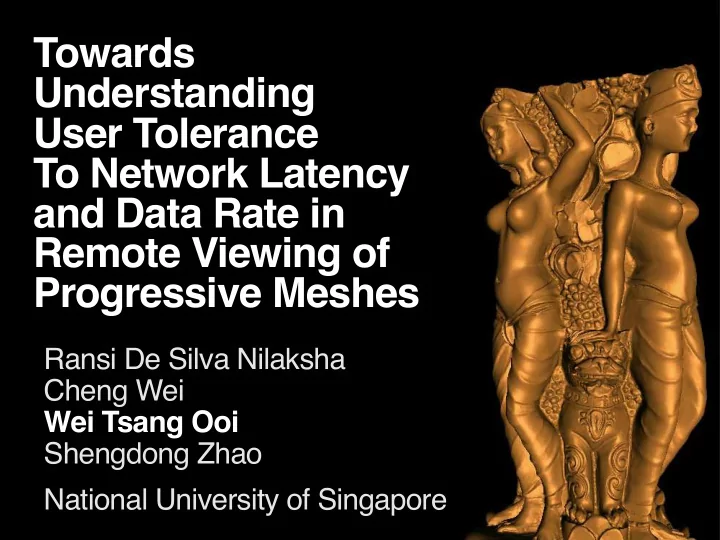

Towards Understanding User Tolerance To Network Latency and Data Rate in f Remote Viewing of Progressive Meshes Ransi De Silva Nilaksha Cheng Wei Wei Tsang Ooi Shengdong Zhao National University of Singapore 1
Towards Understanding User Tolerance To Network Latency and Data Rate in f Remote Viewing of Progressive Meshes Ransi De Silva Nilaksha Cheng Wei Wei Tsang Ooi Shengdong Zhao National University of Singapore 2
3
4
5
Hoppe’s Progressive Mesh Edge Collapse Vertex Split 6
At the sender = ... + v k v 4 v 3 v 2 v 1 base mesh 7
Transmission UDP TCP v 4 ... base v 1 v 2 v 3 v k mesh 8
At the receiver v 4 ... base v 1 v 2 v 3 v k mesh ... ... 9
Vertex Split what to split v how to split v1 v2 10
base mesh 11
12
13
14
complete mesh 15
Receiver-Driven Protocol sender viewer what to split how to split 16
View-Dependent Streaming: only request what is visible, in decreasing order of importance 17
Towards Understanding User Tolerance To Network Latency and Data Rate in f Remote Viewing of Progressive Meshes Ransi De Silva Nilaksha Cheng Wei Wei Tsang Ooi Shengdong Zhao National University of Singapore 18
“quality” time request 19
“quality” data rate delay time request 20
6 seconds 120 KBps 21
22
400 ms 120 KBps 23
24
400 ms 20 KBps 25
26
Towards Understanding User Tolerance To Network Latency and Data Rate in f Remote Viewing of Progressive Meshes Ransi De Silva Nilaksha Cheng Wei Wei Tsang Ooi Shengdong Zhao National University of Singapore 27
what are the acceptable delay and data rate when streaming progressive meshes? 28
why? 29
design of peer discovery protocol 30
provisioning sender’s bandwidth 31
designing error control protocol 32
what affects user tolerance level? 33
shape and size of mesh 34
user task 35
eye-mesh distance 36
shape and size of mesh user task eye-mesh distance 37
how? 38
let users interact with meshes transmitted with specific (delay, data rate) parameters 39
ask: is it acceptable? 40
The Details 41
Thai Statue 253 KB + 16.8 MB 42
Happy Buddha 221 KB + 2 MB 43
Dragon 247 KB + 12.1 MB 44
20 40 60 80 100 KBps KBps KBps KBps KBps 0.4 s 1 s 2 s 3 s 4 s 5 s 6 s 45
20 40 60 80 100 KBps KBps KBps KBps KBps 0.4 s 1 s 2 s 3 s 4 s 5 s 6 s 46
show to user in random order user unaware of parameters user can rotate/translate user indicates whether quality is satisfiable 47
38 participants 48
20 40 60 80 100 KBps KBps KBps KBps KBps ✓ ✓ ✓ ✗ ✗ 0.4 s 1 s 2 s Inconsistent results are filtered out 3 s 4 s 5 s 6 s 49
Thai Statue Happy Buddha Dragon 100 75 % Satisfied Users 50 25 0 1 2 3 4 5 6 RTT (seconds) 50
Thai Statue Happy Buddha Dragon 100 75 % Satisfied Users 50 25 0 20 40 60 80 100 Data Rate (KBps) 51
20 40 60 80 100 KBps KBps KBps KBps KBps ✓ ✗ ✗ 0.4 s ? ✓ 1 s 2 s ? ✗ 3 s ✗ 4 s ✗ 5 s ✗ 6 s 52
what does it mean? 53
1 sec users have higher delay tolerance compared to other interactive media applications 54
progressiveness helps? 55
480 kbps 16 - 18 K vertices / seconds average US upstream BW: 1.1 Mbps average YouTube video: 328 kbps 56
what’s next? 57
shape and size of mesh user task eye-mesh distance 58
prefer higher rate or lower latency? 59
Towards Understanding User Tolerance To Network Latency and Data Rate in f Remote Viewing of Progressive Meshes Ransi De Silva Nilaksha Cheng Wei Wei Tsang Ooi Shengdong Zhao National University of Singapore 60
Recommend
More recommend